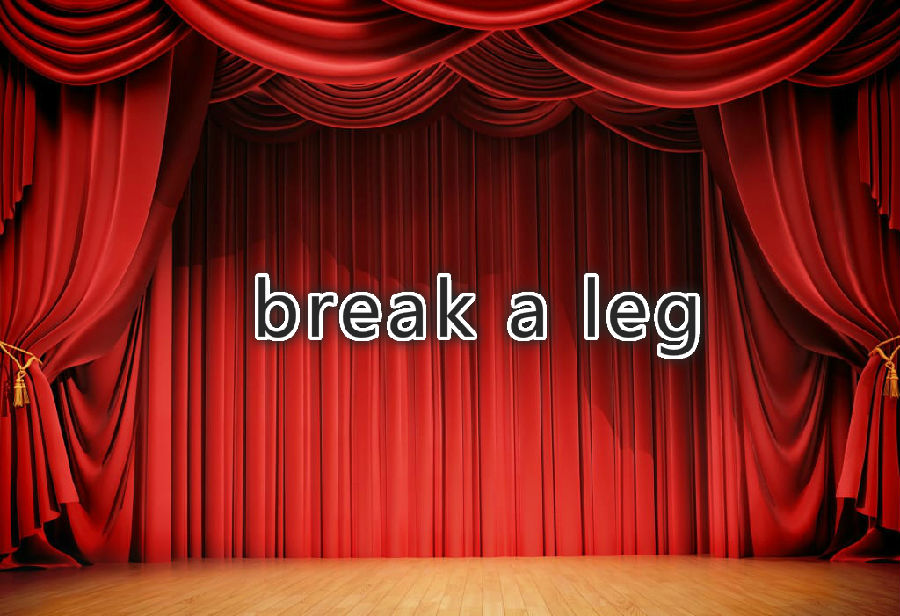(单词翻译:单击)
听力文本
Now, the VOA Learning English program Words and Their Stories.
On this program we explore words and expressions in American English.
Today, we take another trip to the exciting world of live theater. For many performers -- dancers, singers and actors -- appearing on Broadway is a dream come true!
Broadway is one of New York City's first roads and longest. It is also one of the most famous!
Broadway's Theater District is between 42nd and 53rd Streets in downtown Manhattan. This part of Broadway is the heart of American theater.
Broadway was also one of the first streets in New York City to get electric lights. That is why some people call it the "Great White Way."
They say the neon lights on Broadway.
They say there's always magic in the air.
At night, the lights of Broadway seemed to shine brighter than the stars in the sky. And then there are the stars of Broadway's stages.
To make it on Broadway you have to be very good. But you also have to be tough. Performing, in general, comes with a lot of rejection. Actors usually have many doors closed in their faces before other doors, hopefully, open.
But even if you are hard-working and gifted, you may also need something else to succeed on Broadway – luck!
Maybe that is why theater people are so superstitious. They have customs or behaviors that many non-theater people may find strange.
Take for example, the expression "to break a leg." This may sound violent. But it is not. We often say this to wish people good luck.
In the theater, you should never wish an actor "good luck." That is considered to be unlucky. (I told you. They have strange customs.)
Instead, you should say to them, "Break a leg!"
But why? It hardly seems like a nice thing to wish on anyone.
Well, there are several explanations.
One comes from the wings, or the side areas of a stage in a theater. In the wings, you will find what is called a "leg line." If an actor passes this line, people in the audience are able to see them. So, this line helps an actor waiting in the wings stay hidden from the audience before going on stage.

However, it was a good thing, and even lucky, to cross or break the leg line. This meant they were supposed to be on stage and performing. So, an actor who broke the leg line would get paid -- a very good thing, indeed!
Another explanation comes from the superstitious nature of theater people.
To keep bad luck out of a performance, they may try to trick the gods or universe or whatever. They do this by saying something bad -- in this case, "break a leg."
We may not know exactly how this wish of good luck got started. But we do know that it is much better to tell an actor to "break a leg" -- instead of "good luck."
It may come from the theater, but you can say it to anyone who needs a little luck. You can tell a friend "break a leg" before they give a speech at a wedding or a big presentation at work.
Well, you can say this to almost anyone. I would not say "break a leg" to a dancer or an athlete. They may take it the wrong way.
And that's the end of Words and Their Stories. I'm Anna Matteo.
How do you tell people "good luck" in your language? Do you say something different to actors on the stage? Let us know in the Comments Section!
重点解析
1.come from 是……的结果
I'm not surprised that you don't feel well. That's what comes from not eating the right kinds of food.
你觉得不舒服我一点儿也不觉得奇怪。这就是你不好好吃饭的结果。
2.in this case 这里;这次
There happens to be a particular urgency in this case, and it would help if you could bend the rules.
这次碰巧有紧急情况,如果你能通融一下就等于帮了我们一个大忙。
3.take it the wrong way 误会
You should change. Don't take it the wrong way. You look good.
你该换个造型了。别误会,不是说你现在的样子不好看,现在也很好看。
参考译文
欢迎收听本期VOA慢速英语《词汇掌故》。
欢迎和我们一起探索美式英语中的单词和表达方式。
今天,我们将再次踏上一场激动人心的穿越话剧世界之旅。对许多演员——舞蹈家、歌手和演员——而言,登上百老汇的舞台就是梦想照进现实的时刻!
百老汇大街原本是纽约市最早也是最长的道路之一。同时也是最有名的!
百老汇大街的戏剧区位于曼哈顿市中心的第42街和第53街之间。这部分街区也是美国戏剧的心脏。
另外,百老汇还是纽约市最早安装路灯的街道之一。这就是为什么有人会称之为“大白路”的原因。
他们说百老汇的街灯亮起来的时候,
空气中总会有股魔法的味道。
夜里,百老汇大街的灯光似乎比天上的星星还要耀眼。其次便是百老汇舞台上的明星了。
要想在百老汇的舞台上有所成就,你必须非常出色。还要非常坚强。一般来说,表演这个行业是被很多人拒之门外的一个行业。在其他的大门,幸运的话,为他们打开之前,演员们通常都会四处碰壁。
但即使你工作勤奋又有天赋,要想在百老汇成功,你可能还需要另外一个东西——运气!
这一点也许正是戏剧界人士都特别迷信的原因。他们有很多圈外人会觉得很奇怪的习惯和行为。
举个例子,他们的行话“break a leg”。这个词可能听起来有点儿暴力。但事实并非如此。我们经常会用这个短语来祝他人好运。
在剧院里,我们绝对不能跟一个演员说“good luck”(祝你好运)。因为他们圈内人会觉得不吉利。(I told you.They have strange customs.)(跟你说过了。他们的习惯很奇怪。)
相反,你应该对他们说,“Break a leg!”
但是这是为什么呢?用这话来祝他人好运听着完全不像那么回事啊。
事实上,这个问题有几种解释。
一种跟剧场舞台的侧翼或边缘有关。舞台边缘有一条所谓的“leg line”(腿线)。如果一个演员跨过了这条线,观众就能看到TA。所以,这条线能帮助正在舞台边缘候场的演员在上台之前临时躲一躲,不让观众看见。
然而,越过腿线其实是一件好事,甚至是很幸运的一件事。因为这就意味着他们要到舞台中央表演了。这样一来,跨过腿线的演员就能拿到报酬了——确实是一件非常非常好的事情!
另一种解释跟舞台剧圈子的迷信风气有关。
为了避免表演不顺,他们可能会试图欺骗神或宇宙或其他什么东西。这个时候他们就会说一些不好听的话——话剧圈子说的就是“break a leg”。
或许,对这种祝福方式是如何兴起的我们并没有确切的了解。但我们知道,跟一个演员说“break a leg”要比对他说“good luck”要合适得多。
这种说法可能是起源于剧院,但其实对任何需要一点点运气的人我们都可以这么说。朋友在婚礼上发表演讲或在工作中上台发言之前你都可以对他们说“break a leg”。
反正,跟任何人说都没问题。不过我不会跟舞蹈演员或是运动员说“break a leg”。因为他们可能会误会。
以上就是本期的《词汇掌故》了。安娜·马泰奥为您播报。
你的语言里是怎么表达“祝你好运”的呢?演员朋友上台之前你们祝他们演出成功有不一样的说法吗?快来评论区告诉我们吧!


